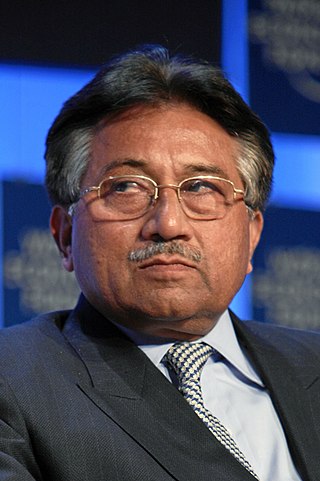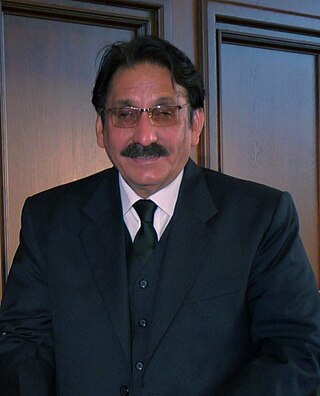
Pervez Musharraf was a Pakistani General and politician who served as the tenth president of Pakistan from 2001 to 2008. He also served as the 10th Chairman of the Joint Chiefs from 1998 to 2001 and the 7th Chief of Army Staff from 1998 to 2007.

Nazim Hussain Siddiqui a Pakistani jurist who served as Chief Justice of the Supreme Court of Pakistan, from 31 December 2003 to 29 June 2005.

Iftikhar Muhammad Chaudhry is a Pakistani jurist who served as the 20th Chief Justice of Pakistan over three non-consecutive terms from 29 June 2005 to 11 December 2013.

Rana Bhagwandas was a Pakistani jurist who served as a senior judge and Chief Justice of the Supreme Court of Pakistan (CJP). He enjoyed extremely high reputation as a judge. He remained the acting CJP during the 2007 judicial crisis in Pakistan, and also briefly became the acting Chief Justice of Pakistan when the incumbent Iftikhar Muhammad Chaudhry went on foreign tours in 2005 and 2006, and thus became the first Hindu and the second non-Muslim to serve as chief of the highest court in Pakistan. Rana Bhagwandas also worked as the Chairman of Federal Public Service Commission of Pakistan. He headed the interview panel for the selection of the federal civil servants in 2009.

Saeed Uz Zaman Siddiqui was a Pakistani jurist and legislator of great prominence who formerly served as the 15th Chief Justice of Pakistan and, prior to that, the 7th Chief Justice of the Sindh High Court. At the time of his death, he was serving as the 31st Governor of Sindh.

Javed Iqbal ; is the retired chairman of the National Accountability Bureau (NAB) of Pakistan, in office from 11 October 2017 to 3 June 2022. He is also a retired Senior Justice of the Supreme Court of Pakistan.
The 12 May Karachi riots, also known as Black Saturday riots, were a series of violent clashes between rival political activists in Karachi. The violence resulted in 58 killings of ethnic Pashtuns. The unrest began as the recently suspended chief justice Iftikhar Muhammad Chaudhry arrived at the Jinnah International Airport on 12 May 2007. Gunfights and clashes erupted across the provincial capital as lawyers, Pakistan Peoples Party (PPP), Awami National Party (ANP), Pakistan Tehreek-e-Insaf (PTI), and Pashtunkhwa Milli Awami Party (PMAP) activists, who supported the judge, and the pro-government Muttahida Qaumi Movement (MQM) activists took to the streets against each other. Pakistan Muslim League Quaid-e-azam PMLQ and MQM party workers, with support from president and military dictator Gen. Pervez Musharraf, were accused of launching highly coordinated attacks against lawyers, ANP, PTI, PPP, and news channels, especially Aaj News. Government machinery was used to block all major roads. Police was accomplice and a silent spectator to the violence. News media was attacked at Guru Mandir when MQM activists began firing at Aaj News headquarters which was shown on live television.
Ali Ahmad Kurd, is a Pakistani lawyer, who served as the president of the Supreme Court Bar Association of Pakistan and was one of the most prominent figures in the Lawyers' Movement of 2007. He opposed the military government of Pervez Musharraf, who ruled the country from 1999 to 2008.
Munir A. Malik is a Pakistani lawyer who has served as the 30th Attorney General of Pakistan. He was a key leader of the Lawyers' Movement in Pakistan. He is the former President of the Supreme Court Bar Association of Pakistan. He was the leader of the legal defence team of Chief Justice Iftikhar Muhammad Chaudhry when the latter was dismissed by General Pervez Musharraf after receiving payment from the establishment.

Chief Justice of Pakistan Iftikhar Muhammad Chaudhry was made a "non-functional Chief Justice" on 9 March 2007. In so acting, President Pervez Musharraf invoked two main clauses of the Constitution of Pakistan. The suspension evoked a nationwide popular mass protest movement led by lawyers, known as the Lawyers' Movement and eventually culminated with the Pakistan Long March.

A state of emergency was declared by President of Pakistan Pervez Musharraf on 3 November 2007 which lasted until 15 December 2007, during which the Constitution of Pakistan was suspended. When the state of emergency was declared, Musharraf controversially held both positions of President and Chief of Army Staff. He later resigned as army chief 25 days into the emergency on 28 November. The state of emergency and its responses are generally attributed to the controversies surrounding the re-election of Musharraf during the presidential election on 6 October 2007, including his holding of both offices of President and Chief of Army Staff at the time.

Abdul Hameed Dogar is a Pakistani jurist who served as the former Justice of Sindh High Court, before being appointed Chief Justice of Pakistan by President Pervez Musharraf, after he dismissed the superior judiciary and declared emergency rule in 2007.
Events from the year 2007 in Pakistan.

The Lawyers' Movement, also known as the Movement for the Restoration of Judiciary or the Black Coat Protests, was the popular mass protest movement initiated by the lawyers of Pakistan in response to the former president and army chief Pervez Musharraf's actions of 9 March 2007 when he unconstitutionally suspended Iftikhar Muhammad Chaudhry as the chief justice of Pakistan's Supreme Court. Following the suspension of the chief justice, the Supreme Court Bar Association (SCBA) declared the judge's removal as an "assault on the independence of judiciary" and was backed by several political parties.

Mian Sakirullah Jan is a former justice in Supreme Court of Pakistan and a former Chief Justice of Peshawar High Court. He is currently serving as the Chairman of the National Industrial Relations Commission.

Tassaduq Hussain Jillani is a Pakistani judge who served as the 21st Chief Justice of Pakistan from 2013 to 2014. He previously served as a justice of the Supreme Court of Pakistan from 2004, after being nominated as a justice of the Lahore High Court by Prime Minister Benazir Bhutto in 1994.

The Provisional Constitutional Order Judges case refers to cases heard and decided by the Pakistan Supreme Court pertaining to the High Court and Supreme Court judges who took their oath of offices under the Provisional Constitutional Order in 2007. On 3 November 2007, then-President Pervez Musharraf declared a Provisional Constitutional Order, which declared a state of emergency and suspends the Constitution of Pakistan. Under this emergency law, all High court judges, including the Supreme Court justices, were asked to take oath under this Provisional Constitutional Order. Those who did not were placed under effective house arrest. A seven-member bench issued a restraining order on the same day, barring the government from implementing emergency rule and urging other government officials to not help do so.

Tariq Mahmood was a Pakistani lawyer and judge. Born in Pakistan, he is most famous as a leader of the Lawyers' Movement in Pakistan.
The Federation of Pakistan v. General (R) Pervez Musharraf, informally known as the Musharraf high treason case, was a court case, in which General Pervez Musharraf who acted in the capacity as chief of army staff, tried for high treason stemming from his imposing of unconstitutional state of emergency on 3 November 2007. In this act, Gen. Musharraf, who was also elected as President of Pakistan, subverted and suspended the writ of the Constitution of Pakistan, dismissing the fifteen justices of the Supreme Court of Pakistan and the fifty-six judges of the provincial High Courts while issuing arrest orders to Chief Justice of Pakistan.
Akhtar Hussain is a Pakistani lawyer, senior advocate of Supreme Court of Pakistan and left wing political leader. He is president of the left-wing political party, Awami Workers Party. He served as the General Secretary of Awami Workers Party from 2016 to 2022. He stayed member of Pakistan Bar Council for ten years from 2010 to 2020 and elected as Vice Chairman in 2012. He was a member of the Judicial Commission of Pakistan for two years from 2019 to 2021.









